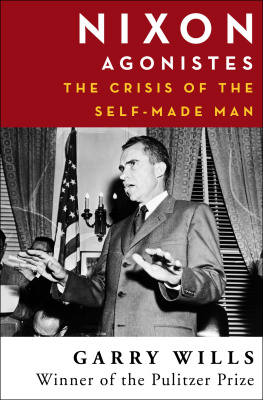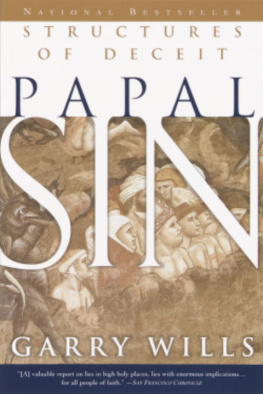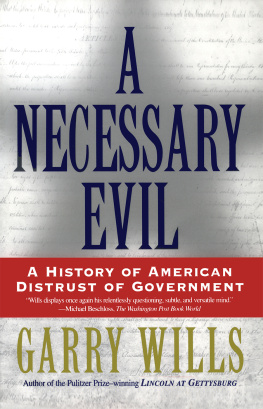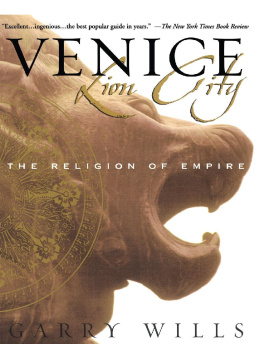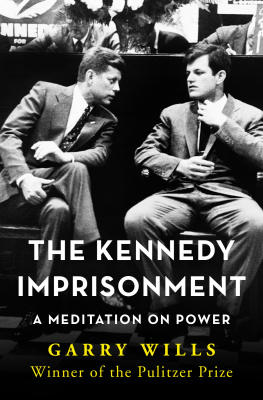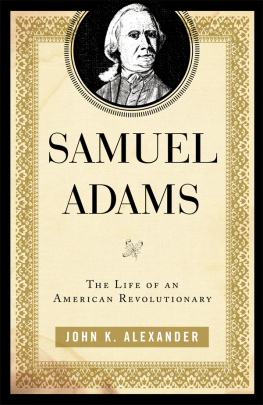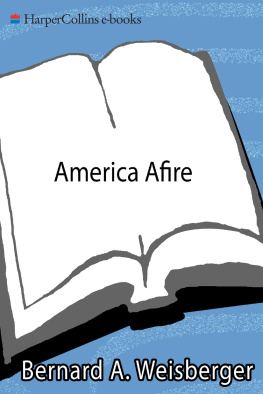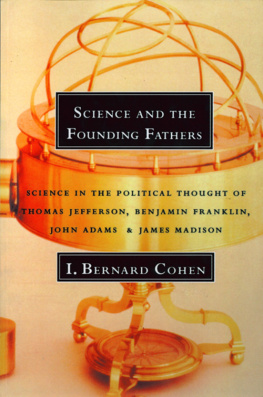Copyright 2005 by Garry Wills
ALL RIGHTS RESERVED
For information about permission to reproduce selections
from this book, write to Permissions, Houghton Mifflin Company,
215 Park Avenue South, New York, New York 10003.
Visit our Web site: www.houghtonmifflinbooks.com.
Library of Congress Cataloging-in-Publication Data
Wills, Garry, date.
Henry Adams and the making of America / Garry Wills,
p. cm.
Includes bibliographical references and index.
ISBN -10: 0-618-13430-1
ISBN -13: 978-0-618-13430-4
1. Adams, Henry, 18381918. History of the United States of
America. 2. United StatesHistoriography. 3. United States
History18011809. 4. United StatesHistory1809-1817.
5. Adams, Henry, 18381918. 6. HistoriansUnited
StatesBiography. I. Title.
E 302.1A2538 2005 973.4'6dc22
2005040305
Printed in the United States of America
Book design by Robert Overholtzer
QUM 10 9 8 7 6 5 4 3 2 1
TO STUDS TERKEL
national treasure
KEY TO BRIEF CITATIONS
| A | Adams Family Papers, Massachusetts Historical Society |
| C | Henry and Charles F. Adams,Chapters of Erie and Other Essays (Henry Holt, 1877) |
| DM | Dumas Malone,Jefferson and His Time, 6vols. (Little, Brown, 19481981) |
| E | Henry Adams,The Education of Henry Adams(Library of America, 1983) |
| G | Henry Adams,The Life of Albert Gallatin(J. B. Lippincott, 1879) |
| GS | Henry Adams,The Great Secession Winter, 186061, and Other Essays, edited by George Hochfield (A.S. Barnes, 1963) |
| H | Henry Adams,Historical Essays(Charles Scribner's Sons, 1891) |
| J | Henry Adams,History of the United States of America During the Administrations of Thomas Jefferson(Library of America, 1986) |
| JP | The Papers of Thomas Jefferson,edited by Julian P. Boyd (Princeton University Press, 1950) |
| L | J. C. Levenson et al., editors,The Letters of Henry Adams(Harvard University Press, 19821988) |
| M | Henry Adams,History of the United States During the Administrations of James Madison(Library of America, 1986) |
| MHS | Massachusetts Historical Society |
| NAR | North American Review |
| R | Henry Adams,John Randolph(Peter Green, 1969) |
| S | Ernest Samuels,Henry Adams,3 vols. (Harvard University Press, 19481964) |
INTRODUCTION
Reading Henry Adams Forward
H ENRY ADAMS IS AN AUTHOR deeply esteemed and widely studiedfor what he wrote in the first decade of the twentieth century, when he was in his sixties. But one of the great mysteries of his life goes all but unnoticed. Why is his major project so little read, appreciated, or studied? When he was in his prime, in his forties, he devoted thirteen volumes of historical study to the first two decades of the nineteenth century in America. His entire life to that point was a preparation for this epic effort, yet praise for the work has mainly been perfunctory or misguided. At the core of the achievement are nine volumes devoted to his country in the years 18001817 History of the United States of America During the Administrations of Thomas Jefferson (four volumes) and History of the United States of America During the Administrations of James Madison (five volumes). That work is flanked by four volumes dealing with the same period The Writings of Albert Gallatin (two volumes), The Life of Albert Gallatin, and John Randolph. He even wrote a fourteenth volume on the period, a life of Aaron Burrbut he suppressed it. There has been no complete study of the History's nine volumes, no detailed discussion of what he was saying in those thousands of pages.
Why is this? Is the History dull, ill-conceived, poorly executed? Far from it. I believe it is the non-fiction prose masterpiece of the nineteenth century in America. It is a work that pioneers the new history coming into existence at the time. It offers archival research on an unprecedented scale in America, and combines it with social and intellectual history, diplomatic and military and economic history. This wealth of material is deployed with wit and a sense of adventure. Adams advances a surprising (almost scandalous) thesisthat the Jeffersonians' four terms at the beginning of the nineteenth century created a national unity and internationalism far in advance of what preceded them. This goes against the announced purpose and subsequent reputation of the Jeffersonians, who claimed to be opposed to such developments. They assumed power to decrease power, to de-centralize the government, to withdraw from international "entanglements."
Adams thinks it is fortunate that they did nothing of the sort. Despite some later changes in his attitude, he was a fervent nationalist and proto-imperialist in the 1880s, cheering on the formation of a trans-sectional politics and an activist federal government. But what is surprising, what gives the volumes their paradoxical flourish, is his contention that only the Jeffersonians could have created the national unity they began by deploring. They alone combined the high vision and practical tinkering, the regional ideology and trans-regional organization, the American optimism and sense of destiny, the ambitions for the West, that could bring it all off. It is said of the British that they acquired an empire in a fit of absent-mindedness. Adams suggests that the Jeffersonians acquired a national identity in the same way. All this makes for exciting reading. Nothing occurs as expected. The History is as full of historical paradoxes as Tolstoy's War and Peace. The shifts and developments in the years covered by Adams call for close and fascinating analysis. Yet the History is neglected, even by Adams scholars (who reserve their scholarship for later works), or it is misrepresented, even by leading historians.
A striking example of misrepresentation is offered by the eminent historian Richard Hofstadter. He claims that the misanthropic Adams actually chose a low and vile period of sixteen years to cover in his History. Why would he do such a thing? To give a dark view of his own country, in keeping with his own pessimism and doubts about democracy. The time of the Jeffersonians, says Hofstadter, was "regarded by the author himself as dreary and unproductive, as an age of slack and derivative culture, of fumbling and small-minded statecraft, terrible parochial wrangling and treasonous schemes, climaxed by a ludicrous and unnecessary war." Every point Hofstadter raises is manifestly wrong. He describes an Adams critical of the War of 1812yet Adams thought that conflict not only necessary but overdue, and he celebrated its feats and heroes with gusto. He sides with Albert Gallatin, who wanted to begin the war during Jefferson's second term.
Hofstadter says that the four presidential terms Adams treats were marked by "small-minded statecraft," though Adams said of the Jefferson-Madison-Gallatin "triumvirate" that "no statesman has ever appeared with the strength to bend their bow" (G 92). In fact, two of the three American leaders Adams admired most (after Washington) were shapers of the period Hofstadter calls "dreary"Gallatin and John Marshalland Adams always claimed that "Washington and Jefferson doubtless stand pre-eminent as the representatives of what is best in our national character or its aspirations" (G 267, emphasis added). He presents the triumph of Jeffersonians over Hamiltonians as a victory of the American mind, since "everyone admitted that Jefferson's opinions, in one form or another, were shared by a majority of the American people" (J 117). The triumph was a fortunate one: "Mr. Jefferson meant that the American system should be a democracy, and he would rather have let the world perish than that this principle, which to him represented all that man was worth, should fail. Mr. Hamilton considered democracy a fatal curse, and meant to stop its progress" (G 159).
Next page

